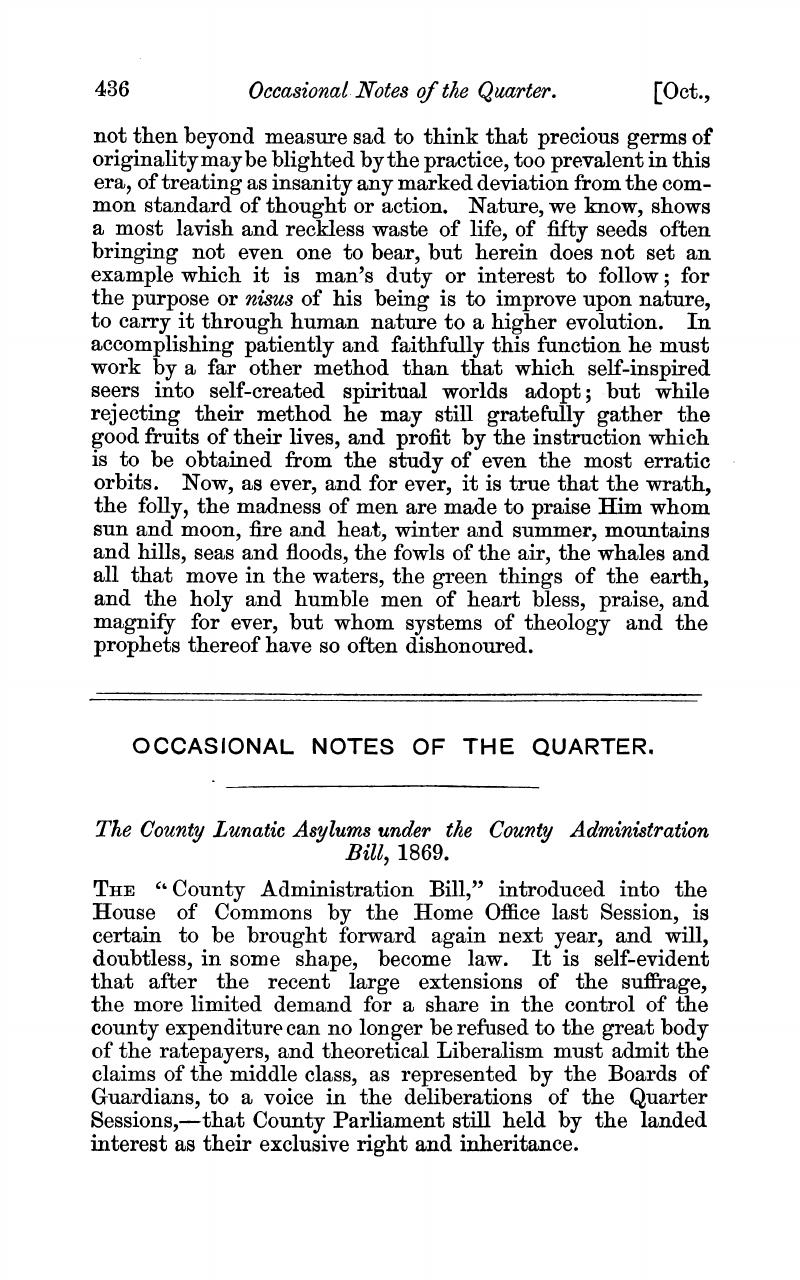No CrossRef data available.
Published online by Cambridge University Press: 19 February 2018

∗ Thus a recent writer in the Lancet points out the necessity which will exist should the County Administration Bill pass, of placing the removal of the officers of the county asylums out of the control of a committee of the county financial boards. “The tenth clause of the County Administrative Bill,” he writes, “provides that the executive powers of the county board may be delegated to a committee, but such committee shall not be deemed to be duly constituted unless it consist of an equal number of official and elected members, the latter of whom must be elected members of boards of guardians in the county. The security, fortunes, and honour of a considerable number of medical men are thus placed absolutely at the disposal of this delegated committee, without any powers of appeal to, or redress from any, superior board or authority whatsoever. That the medical journals, the various Associations, the General Medical Council, and others interested in the general or material prosperity of their professional brethren, should have so long overlooked this definite and pressing grievance, must be a matter of surprise. The subject, nevertheless, had not escaped the scrutiny of some gentlemen of high standing, authority, and acquirements so far back as 1859—Her Majesty's Commissioners of Inquiry into the state of the Irish Asylums. In their valuable and instructive Report, page 9, the opinions and recommendations on the subject of asylum appointments are fully recorded; and with regard to this particular question, the power of discharging the chief officers, they report to Her Majesty that the Government, and not the visiting committees, should have a power of removal, founded on full investigation of the officer's incapacity or misconduct. This document is signed by Sir Thomas Reddington, R. Andrews, Esq., Messrs. Lutwidge and Wilkes, the English Lunacy Commissioners, and by Sir Dominic Corrigan—names of men who have done the State some service. The rights that have been bestowed upon the Irish superintendents must surely be the due of the English ones, nor should the inferior position of the latter be allowed to rest without redress. The Poor-law medical staff have been long emancipated from the power of the village guardians. Will they allow their less fortunate brethren to come within their control? Will they not rather render assistance in obtaining the insertion of a clause in the County Administration Bill, that no medical officer of any asylum, maintained wholly or in part out of the public rates, shall be dismissed without the sanction of the Secretary of State being first obtained, and that founded on a full investigation into the officer's incapacity or impropriety of conduct.” Google Scholar
In the Medical Times and Gazette a similar opinion has been expressed :— Google Scholar
“One of the most important Bills ever introduced into Parliament, affecting the interests of the tax-payer in every county in England, has just been printed by order of the House of Commons. I refer to the County Financial Boards Bill. It has long been a standing axiom in British and Colonial legislation that taxation and representation should be co-extensive, but the doctrine has not hitherto been put into practice in the English counties. The present Bill provides for the establishment of a representative and responsible body, under whose direct control the expenditure of various public institutions will be brought, thus materially altering relations between the officers and the new boards or committees of management. It is, however, with the medical officers of lunatic asylums, and not with clerks of the peace, county surveyors, or cattle-plague officials, that the medical journalist has to deal. The position of gentlemen attached to the above institutions has always been one of peculiar delicacy and difficulty. Too few to make any impression collectively, their condition can only be ameliorated by the aid of their professional brethren, or by the dealing out of that even-handed justice which has produced the Bill itself. Thus while the officers of the Poor-law medical service can only be dismissed for some dereliction of duty after an impartial inquiry, and with the approval of the Poor-law Board, the medical officers of the other branches of the public services in question are in the position of private employés of the Visiting Justices, and are liable to dismissal without any power of appeal. The notable case of Mr. Miller that occurred a few years ago shows that this manner of punishment may be applied with equal effect against the innocent or the guilty. It seems, therefore, but just, that the representatives of the medical profession in Parliament, both general and special, should see that a clause be inserted in the new Bill to the effect that no Medical Superintendent of any asylum, maintained wholly or in part out of the public rates, shall be liable to dismissal without cause being shown to the satisfaction of Her Majesty's Secretary of State for the Home Department.” Google Scholar
eLetters
No eLetters have been published for this article.